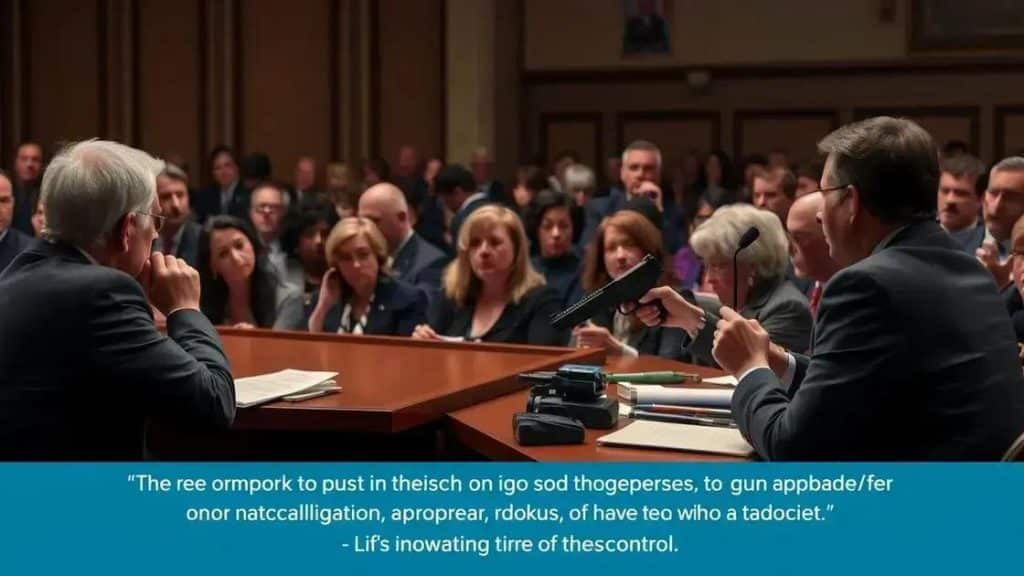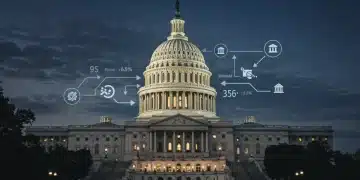Will gun control debate drive change in legislation?

The gun control debate centers on balancing public safety and individual rights, with historical context, public opinion, and future legislative outcomes influencing laws surrounding firearm regulations.
The will gun control debate continues to dominate conversations across the nation, raising questions about safety, rights, and legislation. Have you ever wondered how this impacts your community?
Understanding the current landscape of gun control
Understanding the current landscape of gun control is vital for anyone interested in the ongoing debate. This topic affects many lives and has numerous opinions surrounding it. In recent years, the discussion has intensified, with greater public awareness of various incidents related to gun violence.
Current Trends in Gun Control
Recent statistics showcase the different approaches to gun control across the United States. Many states are re-evaluating their laws and looking into tighter regulations to promote safety.
- States with stricter laws often see lower gun violence rates.
- Public support for background checks has grown considerably.
- Some regions are pushing for more robust gun safety education programs.
- The increase in mass shootings raises new questions about legislation.
This complex landscape is shaped by several factors, including political ideologies, cultural beliefs, and media coverage. Each plays a role in influencing public opinion and policy decisions. Additionally, communities are actively discussing how gun control affects their daily lives.
Public Opinion and Advocacy
Public opinion is a powerful tool in the gun control debate. Many advocacy groups work tirelessly to influence legislation. Citizens often participate in rallies, sharing their stories to highlight the urgency of the situation.
As the conversation around gun control evolves, so do the demands for change. New generations are pushing for reforms, hoping to impact future policies. Learning how to listen to both sides of the argument is essential for a balanced understanding of the situation.
It is crucial to explore what different communities want regarding gun control. Conversations can lead to actionable change and foster understanding between opposing views. Exploring these perspectives will help us recognize the way forward in this ongoing debate.
Key arguments on both sides of the debate
When discussing gun control, it’s important to understand the key arguments on both sides of the debate. Each perspective presents valid points that reflect differing values and priorities.
Arguments for Stricter Gun Control
Proponents of stricter gun control laws argue that increased regulations can lead to fewer gun-related deaths. Some key points include:
- Stricter laws can help prevent firearms from falling into the wrong hands.
- Countries with tighter regulations see lower rates of gun violence.
- Background checks can reduce incidents of mass shootings.
- Gun safety education promotes responsible ownership among enthusiasts.
These supporters often cite statistics and case studies to emphasize the effectiveness of regulations in enhancing public safety. They believe that protecting citizens from gun violence outweighs the right to possess firearms.
Arguments Against Stricter Gun Control
On the other side, opponents of enhanced regulations highlight individual freedoms and personal safety. Their arguments include:
- Gun ownership is a constitutional right protected by the Second Amendment.
- Law-abiding citizens should not be penalized for the actions of criminals.
- Self-defense is a fundamental right, and firearms are crucial for personal protection.
- Restrictions can create a black market, making it harder to track illegal firearms.
These individuals often advocate for education and responsible gun ownership rather than more laws. They argue that focusing on mental health and criminal behavior could be more effective in reducing violence.
Understanding these perspectives is essential for anyone wishing to engage in meaningful discussions about gun control. The conversation must acknowledge the balance between rights and safety, paving the way for informed decision-making.
Effects of public opinion on gun legislation

The effects of public opinion on gun legislation are significant and often shape the policies enacted by lawmakers. When citizens engage with their representatives, they can influence the direction of legislation regarding firearms.
Shifts in Public Attitude
Public attitudes toward gun control can change rapidly, especially after high-profile incidents involving gun violence. These events often spark national conversations and lead to increased advocacy for change. For example:
- After mass shootings, support for stricter background checks usually rises.
- Surveys often show that a majority favor measures like waiting periods and mandatory training.
- Social media campaigns can amplify voices advocating for reform, directly impacting public discourse.
- Local protests and movements can influence state legislatures to reconsider their stances on gun control.
Citizens voicing their opinions through polls, petitions, and activism can lead to tangible changes in laws. When people are vocal about their experiences and beliefs regarding firearms, it pushes lawmakers to address these views.
The Role of Advocacy Groups
Advocacy groups play a critical role in shaping public opinion on gun legislation. These organizations mobilize individuals, conduct research, and engage in lobbying efforts to steer policies in a desired direction.
Groups such as the National Rifle Association (NRA) and Everytown for Gun Safety actively campaign to either protect or impose regulations related to firearms. Their efforts can heavily influence the perceptions held by the public, especially among undecided individuals.
Understanding how public opinion influences gun legislation is crucial for effective civic engagement. When people realize that their voices matter, they are more likely to participate in discussions and actions that can lead to meaningful change in gun policy.
Historical context of gun control laws
The historical context of gun control laws reveals how societal values and events have shaped firearm regulations over the years. Understanding this background is crucial for grasping present-day debates and policies.
Early Gun Laws
In the early days of the United States, the right to bear arms was closely tied to self-defense and militias. Laws regulating firearms were minimal, allowing individuals significant freedom in owning and using guns. This historical foundation established a strong culture around gun ownership.
As the nation expanded, so did the need for regulations. Events like the Civil War and the rise of organized crime in the 20th century led to initial calls for control over firearm access.
Significant Legislation
Several key laws marked shifts in the landscape of gun control. The National Firearms Act of 1934 imposed regulations on machine guns and sawed-off shotguns, representing the first federal steps toward regulating firearms. Another significant moment was the Gun Control Act of 1968, which was passed in response to rising violence and assassinations during the 1960s. This act regulated the sale and transfer of firearms and established standards for firearm dealers.
These laws were pivotal in shaping modern firearm regulations. Over the years, various amendments and court rulings have continued to impact the scope and enforcement of gun laws.
Recent Developments
The last few decades have seen increasing public demand for gun control, especially following high-profile mass shootings. Incidents like those in Sandy Hook and Parkland sparked nationwide debates about the effectiveness of existing laws and the need for stronger regulations. This has resulted in numerous state-level initiatives aimed at tightening gun laws.
Despite these efforts, opposition remains strong, rooted in the belief that individuals should retain their rights to own firearms. Understanding the ongoing shifts in public sentiment and legal frameworks is essential for comprehending the current state of gun control laws.
Potential future outcomes of the gun control debate
The potential future outcomes of the gun control debate hold significant implications for individuals and communities across the nation. As discussions evolve, various scenarios could emerge, shaped by public opinion, advocacy efforts, and political actions.
Increased Legislation
One possible outcome is the implementation of stricter gun control laws. This could include measures like:
- Mandatory background checks for all gun purchases.
- Red flag laws that allow for the temporary removal of firearms from individuals deemed a danger to themselves or others.
- Limitations on certain types of firearms, such as assault weapons.
- Improved mental health resources and screening for gun purchasers.
If these measures come to pass, it may lead to a decrease in gun violence. However, it could also spark strong resistance from gun rights advocates.
Judicial Challenges
Another potential outcome involves legal battles over any new gun control laws. Court challenges could arise, especially if legislation is perceived to infringe upon constitutional rights. These judicial challenges may shape the enforcement and effectiveness of laws across different states.
Additionally, landmark court rulings could redefine the limits of the Second Amendment, impacting future legislation. Therefore, how courts interpret gun control laws will be a critical factor moving forward.
Shifts in Public Attitude
Public opinion plays a pivotal role in determining how the gun control debate unfolds. Increased advocacy by grassroots movements, especially following violent incidents, can lead to more significant legislative changes. If citizens continue to call for action, lawmakers may feel pressure to respond.
On the other hand, if gun rights advocates manage to sway public sentiment or capitalize on fears of overreach, we might see a pushback against tighter regulations. This dynamic interaction between public opinion and legislation will shape the future of gun laws.
Technological Innovations
Lastly, advancements in technology may influence the landscape of gun control. Innovations such as smart guns, which can only be fired by authorized users, could offer solutions to safety concerns. Furthermore, improved tracking systems could be introduced to monitor firearm sales and ownership.
Overall, the future of the gun control debate is uncertain and complex. As various factors interplay, the outcomes will continue to evolve, making it essential for all stakeholders to stay informed and engaged.
FAQ – Frequently Asked Questions about the Gun Control Debate
What is the main focus of the gun control debate?
The main focus of the gun control debate is balancing public safety with individuals’ rights to own firearms. Different perspectives emphasize either the need for stricter regulations or the protection of Second Amendment rights.
How does public opinion influence gun legislation?
Public opinion significantly influences gun legislation by shaping lawmakers’ actions. When citizens express strong views on gun control, whether for or against, it can prompt changes in legislation or enforcement.
What historical events have impacted gun control laws?
Several historical events, such as mass shootings and the rise of organized crime, have led to the implementation of significant gun control laws, including the National Firearms Act of 1934 and the Gun Control Act of 1968.
What are some potential future outcomes of the gun control debate?
Potential future outcomes include increased legislation for stricter gun control, ongoing judicial challenges to new laws, shifts in public attitudes towards gun rights and regulations, and advancements in firearm technologies.





